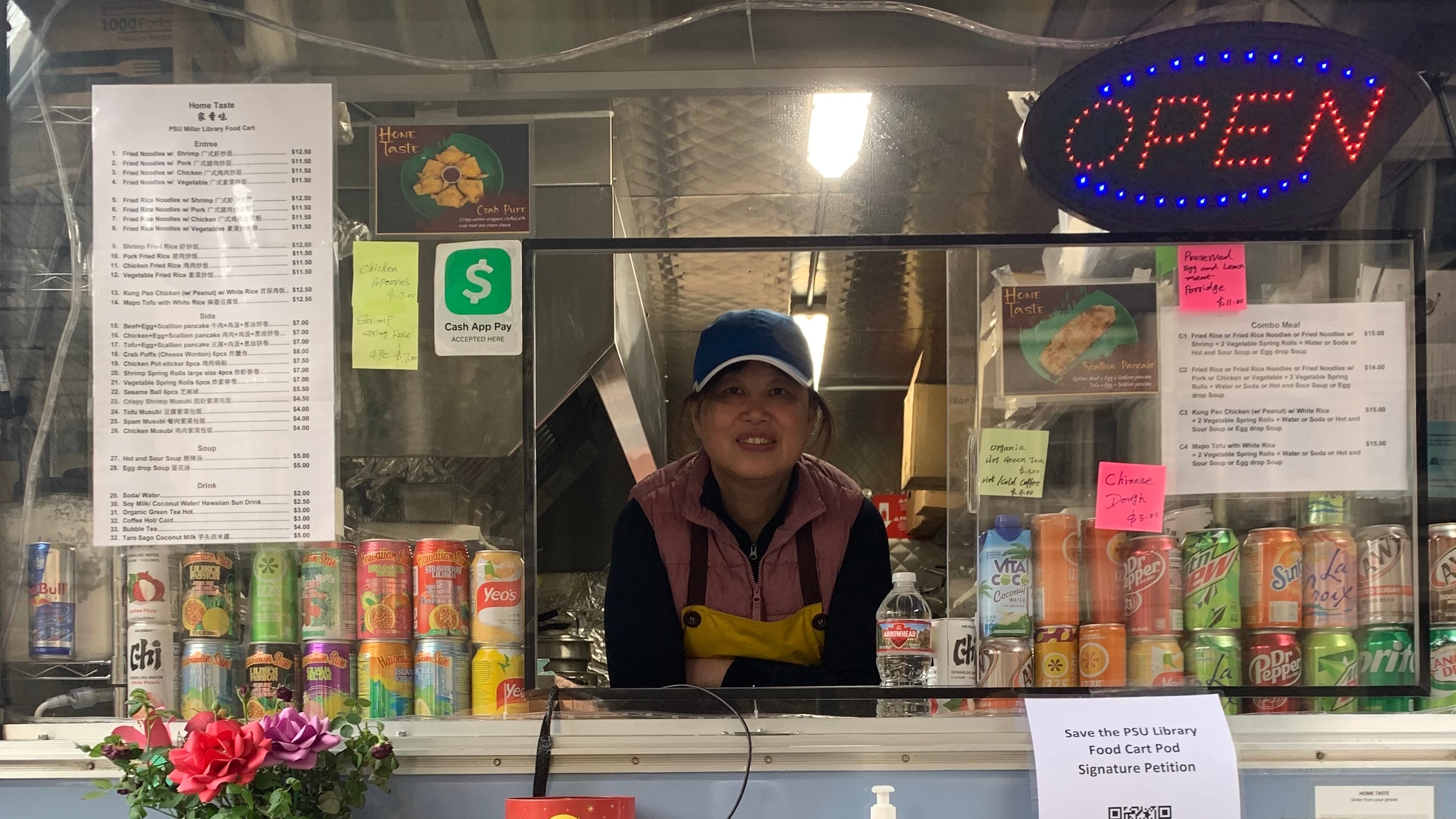Portland State University student Jonathan Fleming has been eating lunch at the Lao street food cart Khao Niew every Monday and Wednesday for the past two months. The most popular dish there is the nam khao, a crispy rice salad served with lettuce wraps, though today Fleming ordered the fried wings with papaya salad.
Fleming, who is studying to be a special education teacher, is trying to “cherish” his time at the on-campus food cart pod, knowing that it is set to close July 1.
The four food carts next to the Millar Library will have to find a new home by then due to a lack of wastewater infrastructure at the site.
“We know that the library carts are treasured by many, but when the county’s rules around wastewater disposal changed last year, it affected many food carts,” said Jason Franklin, the university’s associate vice president for planning, construction and real estate, in a Feb. 26 statement. “We worked hard for several months to find a cost-effective solution to keep the carts in place, but in the end we couldn’t make it work.”
That solution is a retrofit to install a direct drain line to the sewer for every cart, according to Nong Phimmoungkhoun, the owner of Khao Niew. It would cost between $40,000 and $50,000. Right now, he stores his dirty dishwater—known as “graywater”—in a big tank underneath the cart, which he has owned for almost two years. Every week, Phimmoungkhoun pays a company to come pump it out and dispose of it.
Phimmoungkhoun used to be allowed to keep a big tank on the side of his cart for graywater, but those standards changed last year. The tightening rules come after years of concerns and Multnomah County meetings about rat infestations and wastewater spills at food cart pods, going back to 2017. The rules have been affecting food cart pods across the state since January 2023.
PSU’s facilities and property management department asked the food cart owners to relocate Feb. 15 after a “lengthy effort” to try to accommodate changing city and county regulations regarding the disposal of wastewater generated by the carts, the university said in the statement.
The five-figure retrofit would have to come from PSU’s retail business operations, which haven’t fully recovered since COVID, according to school spokeswoman Katy Swordfisk. PSU “simply doesn’t have the funds available” to invest in the infrastructure required to keep the pods open, she says.
“I think it’s incredibly short-sighted for the administration to avoid further investment in a cart pod that so clearly benefits students—especially given that we’re in the midst of a major strategic planning initiative designed to revitalize PSU’s campus and to increase enrollment,” says one PSU professor who’s asked to remain anonymous. “Also, as a faculty member who teaches night courses, this food cart pod is one of the few elements that activates our campus at night—otherwise it can feel a bit like a ghost ship and a food desert. We should be making space for more food carts, not evicting them.”
“It’s heartbreaking for me to have to leave here because I feel like it’s community, like a family-type vibe with all the staff and all the students,” Phimmoungkhoun says. “I love it here.”
The neighboring cart, Home Taste, is a Chinese food cart owned by Susan Feng. She appreciates how PSU security officers and the campus location have insulated the cart pod from many of the safety, graffiti and sanitation issues that other pods in Portland constantly battle. Feng echoes Phimmoungkhoun’s sentiment about the community around the pod—if students forget their credit cards, she often feeds them for free and allows them to pay later. Feng is also quick to offer a free cup of hot and sour soup.
The Millar Library pod also includes the trucks Sheesh Shawarma and Asian Fusion.
Fleming, the education student, has joined about 1,400 in the PSU community in signing a petition to save the cart pod.
“I’m really annoyed that there isn’t more work to be done in support for this pod from PSU,” Fleming says. “And I’m concerned, in general, about the food cart culture in Portland, which is such a big part of what I love here.”

